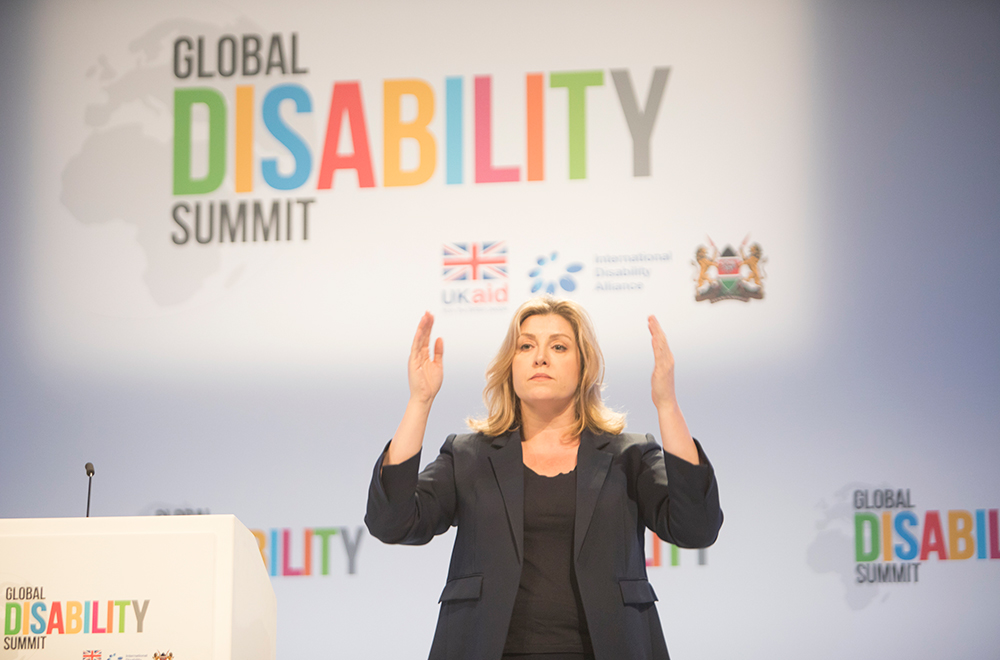The first Global Disability Summit, held in London in July, yielded 170 ambitious commitments to tackle stigma and discrimination against people with disabilities. Among the most significant pledges made were commitments to pass transformative new laws to protect the rights of people with disabilities, as well as assurances to help those affected by humanitarian crises. There were also commitments to assist with access to technology and work with the private sector worldwide to reduce prices.
UK International Development secretary, Penny Mordaunt (pictured), called on governments and donors to follow the UK’s lead and “stand alongside people with disabilities in their country, commit to ending stigma, and fully value the contribution they can make to the success of their nations.
“It is fantastic to see such ambitious commitments made from countries and organisations at today’s summit,” Mordaunt said. “But, if we are going to help people with disabilities to fulfil their true potential, today cannot just be about words, it has to be about action. We need to hold ourselves and our partners to account and make sure these commitments produce genuinely transformative results for people with disabilities worldwide.”
Representing Australia at the summit was Minister for International Development, Concetta Fierravanti-Wells. The minister delivered a keynote on inclusive humanitarian action and participated in a roundtable discussion with humanitarian leaders.
Disability inclusion is a priority for Australia’s international engagement in development, humanitarian assistance and human rights and the summit was an opportunity to galvanise the global effort to address disability inclusion in developing countries, Senator Fierravanti-Wells told F2L.
“The UK, Kenya and International Disability Alliance did an excellent job in hosting this event which attracted an amazing number of people from around the world, all committed to advancing the rights of people with disabilities and supporting their inclusion in global development. With so many committed people together there was a palpable atmosphere of energy and excitement at the summit,” she said.
Supporting Disabled People’s Organisations (DPOs) in developing countries to build their capacity is key to Australia’s approach to disability inclusion. “I was pleased to see that people with disabilities played a central role in the design and delivery of the summit, as well as the Civil Society Forum held the day before.”
A personal highlight for the senator was the opportunity to meet UK and Canadian counterparts, Penny Mordaunt and Marie-Claude Bibeau: “two impressive women who are helping to drive a more inclusive approach to international development. Penny Mordaunt delivered part of her opening address to the summit in sign language, which was extremely well received by all present”.
The senator also joined a group of humanitarian leaders for a roundtable discussion to share specific challenges and opportunities around the inclusion of people with disabilities across the humanitarian cycle, including preparedness, response and recovery.
The aim of the summit was to build momentum for disability inclusion in developing countries by encouraging commitments to inclusive education, economic empowerment, technology and innovation, addressing stigma and discrimination, gender inequality and conflict and humanitarian contexts.
Nine national governments committed to passing or formulating new or revised laws to give people with disabilities greater rights in the countries in which they live; new action plans on disability inclusion and pledges to support more people with disabilities affected by humanitarian crises. This included the Australian Government who will give $16.4m to support disability inclusive action in response to the Syrian crisis.
Organisations and governments, including USAID, The World Health Organization and UNICEF, along with the UK, joined the Global Partnership on assistive technology, aimed at transforming access to, and the affordability of, life changing devices and basic technology, like wheelchairs and glasses.
Among the initiatives created was a new online platform, where summit commitments will be recorded and tracked over coming months and years. All attendees were invited to sign the Charter for Change, the principal legacy document of the summit which aims at ensuring global consensus to address a long-neglected issue pertaining rights of persons with disabilities such as inclusion to education, employment, independent living, voting and access to justice, among others.

